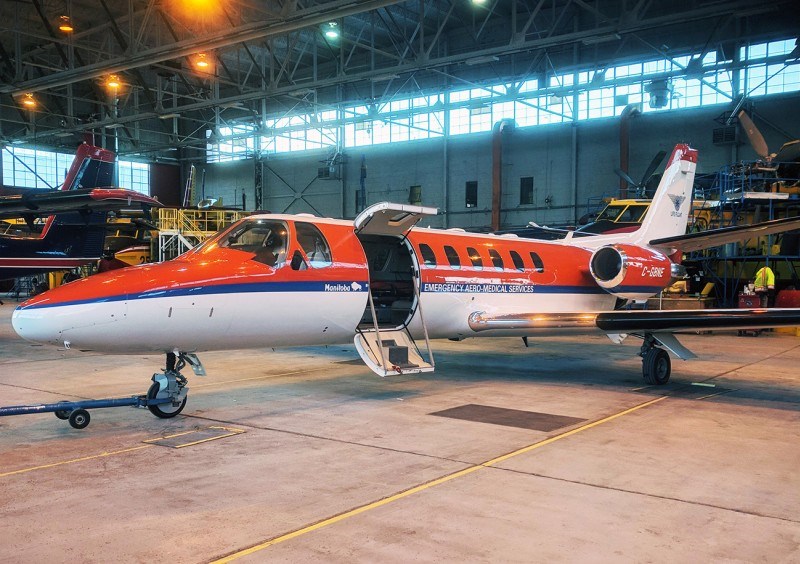The Manitoba government’s decision to stop using government-owned planes to provide air ambulance services has resulted in job losses in Thompson and Winnipeg, suspensions off service and a call for the auditor general to look into air ambulance privatization.
The provincial government announced June 6 that the Lifeflight air ambulance program for critically injured patients outside a 200-kilometre radius of Winnipeg would no longer be using two government-owned Citation as early as sometime in June. The province said this was because recruiting for highly specialized positions related to operating these jets is difficult due to the specific training and qualifications required along with significant competition from private-sector employers. The government-owned jets were used in about half of all air ambulance flights in 2018.
Nine pilots and a maintenance crew were laid off June 26 and the Manitoba Government and General Employees’ Union (MGEU) filed a group grievance on their behalf July 5 as well as grievances for four individual members.
MGEU president Michelle Gawronsky says the civil services collective agreement requires 40 days’ notice of layoffs of senior employees.
“It’s pretty clear violation of the collective agreement and shows a complete lack of respect, “ she said in an MGEU press release, noting that the laid-off employees had their benefits and pensions terminated immediately. “If you had tried to find a more callous way to lay off hard-working employees, I don’t think you could. These people had a collective agreement in place that was ignored. They weren’t provided with proper notice. They weren’t even able to remove all of their personal effects from the workplace.”
CBC reported July 4 that Manitoba Shared Health chief executive officer Brock Wright issued a memo June 15 asking Manitoba health authorities and clinical leaders to provide staff to assist with medical transportation of adult patients because Lifeflight doctors have not been boarding air ambulance planes for the last two weeks, since the province grounded its Citation jets. Lifeflight operations were taken over on an interim basis by Babcock Canada and Vanguard Air Care, a division of Fast Air, June 28.
Lifeflight program medical director Renate Singh told the Winnipeg Sun that some private planes used for air ambulances in the past haven’t had the right equipment to move critical care patients and weren’t able to land on short gravel runways in some smaller communities and that adding these required safety features could take weeks or months.
“The [Premier Brian] Pallister government has made an absolute mess of the Lifeflight situation,” Manitoba NDP leader Wab Kinew said on Twitter July 2. “These are the critical care air ambulances that serve people around the province. The government has tried to privatize but has instead disrupted an essential service. The Pallister government should tell Manitobans whether any Lifeflight air ambulances are flying right now. ‘Election blackout’ or not, this is important public health information.”
Manitoba Liberal leader Dougald Lamont and River Heights MLA Jon Gerrard wrote to Manitoba auditor-general Norm Ricard June 14 asking him to audit the government’s handling of Lifeflight air ambulance privatization. It said private-sector operators of jets like the Citation are not permitted to land on gravel runways that the government-owned planes were and that using smaller turboprop planes that can’t fly above bad weather will result in longer flight times and delays in transporting critically ill and injured patients. They also noted that the service was unable to operate for three days on the weekend after the province announced its plans to stop using its Citation jets.
“There were immediate severe disruptions to patient service including specific incidents in Swan River and Dauphin,” said the latter.
The Liberal party said June 27 that the office of the Auditor General had been in touch with them and that a meeting would take place in the coming weeks.
A Beech B200 medevac aircraft operated by Keewatin Air LP flying from Winnipeg to Churchill with two crew members and tow nurses on board crash-landed near Gillam Airport April 24 because of a fuel issue. A summary of the incident on the Transportation Safety Board of Canada’s website said both engines flamed out during an emergency descent due to insufficient fuel and that the plane touched down on the ice of Stephens Lake short of the runway. The plan struck a rocky berm near the threshold of the runway and came to a stop near the right side of the runway threshold. No on was injured but the plane was substantially damaged.




